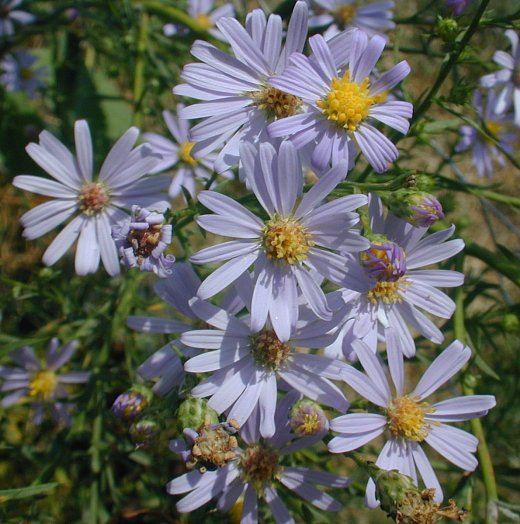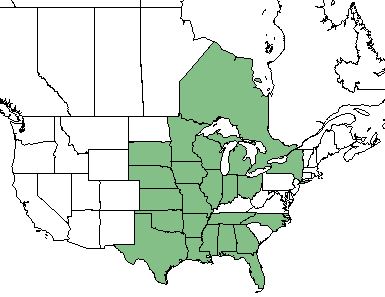Difference between revisions of "Symphyotrichum oolentangiense"
Krobertson (talk | contribs) |
Krobertson (talk | contribs) |
||
| Line 31: | Line 31: | ||
==Ecology== | ==Ecology== | ||
===Habitat=== <!--Natural communities, human disturbed habitats, topography, hydrology, soils, light, fire regime requirements for removal of competition, etc.--> | ===Habitat=== <!--Natural communities, human disturbed habitats, topography, hydrology, soils, light, fire regime requirements for removal of competition, etc.--> | ||
| − | This species occurs in prairies and glades.<ref name="Weakley 2015"/> | + | This species occurs in prairies and glades.<ref name="Weakley 2015"/> It prefers mesic to dry soils.<refname="Ladybird"/> and |
===Phenology=== <!--Timing off flowering, fruiting, seed dispersal, and environmental triggers. Cite PanFlora website if appropriate: http://www.gilnelson.com/PanFlora/ --> | ===Phenology=== <!--Timing off flowering, fruiting, seed dispersal, and environmental triggers. Cite PanFlora website if appropriate: http://www.gilnelson.com/PanFlora/ --> | ||
Revision as of 15:43, 22 January 2018
| Symphyotrichum oolentangiense | |
|---|---|

| |
| Photo by | |
| Scientific classification | |
| Kingdom: | Plantae |
| Division: | Magnoliophyta - Flowering plants |
| Class: | Magnoliopsida - Dicots |
| Order: | Asterales |
| Family: | Asteraceae |
| Genus: | Symphotrichum |
| Species: | S. oolentagiense |
| Binomial name | |
| Symphyotrichum oolentangiense (Riddell) G.L. Nesom | |

| |
| Natural range of Symphyotrichum oolentangiense from USDA NRCS Plants Database. | |
Common Name(s): azure aster;[1] skyblue aster[2]
Contents
Taxonomic Notes
Synonym(s): Aster oolentangiensis; A. azureus var. azures[1]
Varieties: S. oolentangiense var. laevicaule; S. oolentangiense var. oolentangiense[1]
Description
Symphyotrichum oolentangiense is a dioecious perennial[2][3] that grows as a 1-3 ft (0.30-0.91 m) forb/herb or subshrub.[2] It produces a bluish purplish flower with yellow center.[3]
Distribution
S. oolentangiense is found from New York to Minnesota and South Dakota, south to the Florida Panhandle westward to Texas, although it is absent in several states along the Atlantic coast.[1][2]
Ecology
Habitat
This species occurs in prairies and glades.[1] It prefers mesic to dry soils.<refname="Ladybird"/> and
Phenology
Flowering occurs from August through November.[1]
Pollination
This species is known to attract butterflies and many species of native bees.[3]
Conservation and Management
Cultivation and restoration
Photo Gallery
References and notes
- ↑ 1.0 1.1 1.2 1.3 1.4 1.5 Weakley AS (2015) Flora of the Southern and Mid-Atlantic States. Chapel Hill, NC: University of North Carolina Herbarium.
- ↑ 2.0 2.1 2.2 2.3 USDA NRCS (2016) The PLANTS Database (http://plants.usda.gov, 12 January 2018). National Plant Data Team, Greensboro, NC 27401-4901 USA.
- ↑ 3.0 3.1 3.2 Plant database: Symphyotrichum oolentangiense. (12 January 2018) Lady Bird Johnson Wildflower Center. URL: https://www.wildflower.org/plants/result.php?id_plant=SYOO